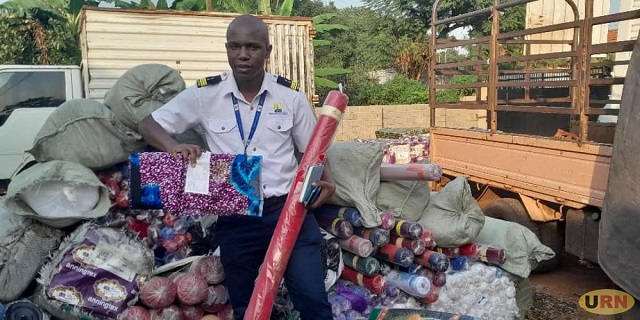
Jinja, Uganda | THE INDEPENDENT | Uganda Revenue Authority (URA) has successfully impounded two trucks loaded with fabrics illegally smuggled into the country through porous border points in different parts of Eastern Uganda. The operation, prompted by vigilante tip-offs, resulted in the seizure of fabrics worth millions of Shillings.
The smuggled goods, totaling 5.5 tonnes of Kitengi fabric and other textiles valued at 231 Million Shillings, were intercepted at a URA checkpoint along the Jinja-Kampala highway. The vigilant tip-offs revealed a modus operandi where suspected smugglers purchased goods in large quantities from China, broke bulk, temporarily stored them in various locations within Kenya, repacked the items, and then smuggled them in small quantities into Uganda.
Owners of the impounded goods, who evaded taxes amounting to 231 Million Shillings, now face fines and penalties. According to section 200 of the EAC Customs Management Act, smugglers are fined 50% of the product’s market value before deducting the tax levies. Additionally, section 199 of the same Act empowers URA to fine the means of conveyance, in this case, the two trucks, with 19 Million Shillings each.
Paul Karatunga, URA’s supervisor of customs enforcement in Eastern Uganda, highlighted the agency’s commitment to intensifying surveillance systems to track down illicit traders and smugglers. He called on the public to be primary whistleblowers, emphasizing that tax evasion hampers business competitiveness, as smuggled goods often undercut prices compared to those with fully remitted tax levies.
Karatunga outlined the challenge of porous points along Lake Victoria, exploited by smugglers due to limited surveillance. Despite these challenges, URA relies on intelligence-led information to identify culprits and impound goods.
James Mubi, the Kiira regional police spokesperson, confirmed the prevalence of fabric smuggling, noting that some smugglers transport goods using motorcycles or commuter taxis to bypass URA checkpoints. Smuggled fabrics, often transported in sacks or backpacks, have become a growing concern, leading to intensified police efforts to curb the illegal trade. The URA operation reflects ongoing efforts to combat smuggling and enforce tax compliance, emphasizing the importance of public collaboration in identifying and reporting illicit activities.
*******
URN



